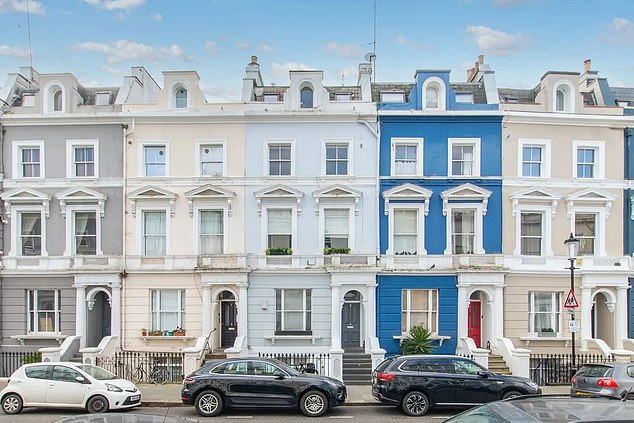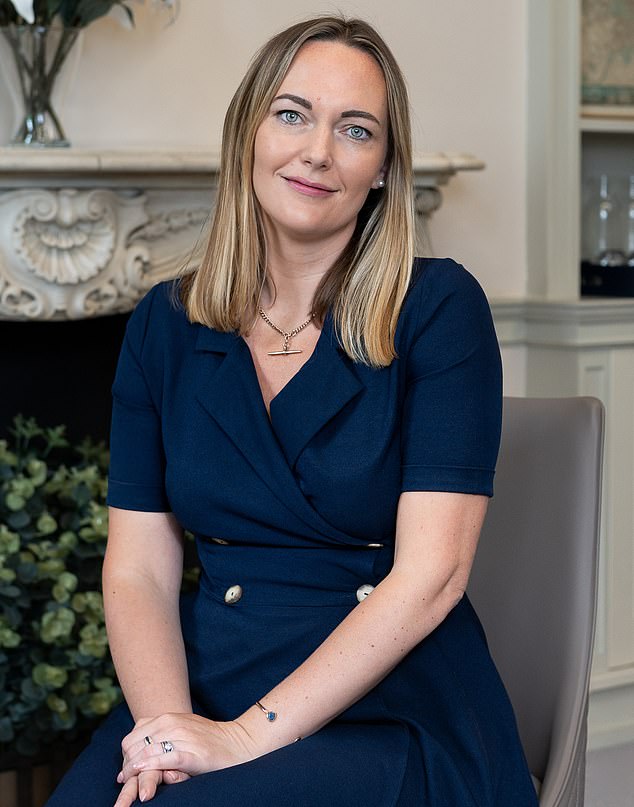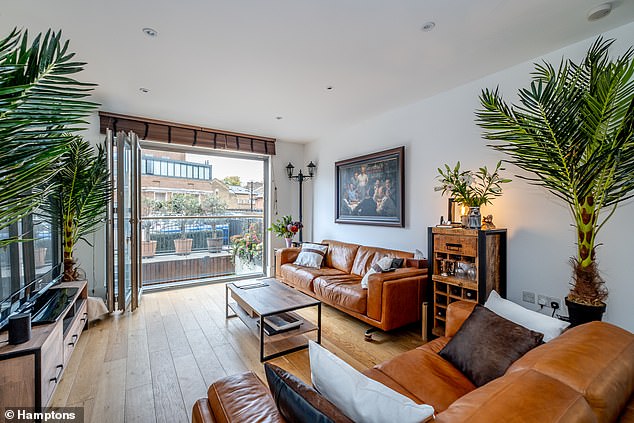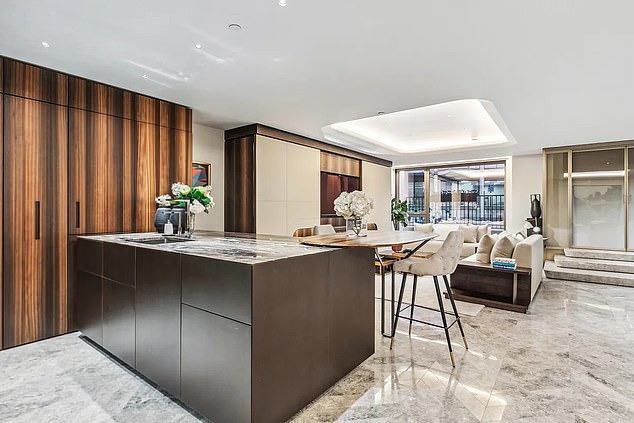From the Georgian squares of London’s ritziest neighbourhoods to the blocks of flats on the outskirts, a cold chill has descended over the London property market.
House price growth is dead in the water – at 0.7 per cent in a year, it’s the worst performing area of the country, according to the latest official figures.
In many areas of the capital, prices are plunging as desperate sellers slash asking prices in the hope of snagging a buyer. Sellers simply cannot shift their properties – and selling times are extending relentlessly.
So what has killed off the market – and what will it take to revive it?
BUDGET GLOOM
When speculation broke that Chancellor Rachel Reeves is considering a new property tax in the autumn Budget, London’s stuttering property market took a sucker punch.
Reeves is apparently mulling plans to scrap stamp duty and instead introduce a property tax on homes worth over £500,000.
This would be payable every year at a rate set by the Government based on a house’s value when it is purchased.

Ladbroke Grove, price drop £425k: A one-bedroom top-floor flat in Notting Hill was listed in April 2025 at £875,000, and by July had been reduced to just £450,000. The flat is near to four Tube stations and four local schools
As the average house price in London is £561,000 – double the national average, according to the Office for National Statistics – most homeowners in the capital would be hit.
Buyers are sitting tight to see if the Chancellor goes ahead. After all, no one would want to fork out for stamp duty if it was abolished just weeks later in the Budget on November 26.
Similarly, there is speculation that Reeves could remove valuable capital gains tax relief on pricier properties.
Capital gains tax is charged on the increase in the value of an asset when you sell it. It is applied to the sale of second properties, but not main homes.
That means that even if you bought your home for £100,000 and sold it years later for £500,000, you wouldn’t pay any tax on the gain. If this relief was removed for pricier homes, sellers would face a bill on their gains.
The current capital gains tax rates are 18 and 24 per cent for basic and higher-rate taxpayers.
Polly Ogden Duffy, managing director of agent John D. Wood, says: ‘Buyers are just waiting it out until the Budget.
‘There are vast amounts on the market, lots of properties have been devalued in the past eight weeks and the time between offer and completion is the longest I’ve seen in my 22-year career.’
She adds that the market above £1.5 million has been particularly affected. At the moment, stamp duty on a property selling for this sum would be payable at 12 per cent, or £93,750, or £168,750 on a second home as stamp duty is higher – eye-watering sums deterring both buyers and sellers.
ENTRENCHED PROBLEMS
Fears over the upcoming Budget are the final straw – the London property market was already looking gloomy.
The abolition of the non-dom tax regime has led many wealthy residents to decamp to more tax-friendly jurisdictions such as Dubai, resulting in a drop in the number of buyers.

Polly Ogden Duffy, managing director of agent John D. Wood, says: ‘There are vast amounts on the market, lots of properties have been devalued in the past eight weeks and the time between offer and completion is the longest I’ve seen in my 22-year career’
Plus, property prices in the capital have become increasingly unaffordable, diminishing the pool of potential buyers.
Richard Donnell, executive director at property website Zoopla, says: ‘London’s market has seen house prices underperform the rest of the UK for almost a decade. Higher mortgage rates since 2022 have increased affordability pressures.
Home values have been broadly flat in inner London, where the market relies more on international buyers.’
HEFTY PRICE DROPS
Above £5 million things are especially dire, says Camilla Dell of buying agent Black Brick Property Solutions. ‘There’s unprecedented supply in areas such as Mayfair, Belgravia, Kensington and Chelsea, Knightsbridge. This can only mean that prices will come down further.’
Prices in prime central London are already 22 per cent lower than their 2014 peak, according to estate agent Savills.
The average price of a flat in prime central London this year so far is £1,887,488, down from £2,141,936 last year, according to the analyst LonRes – the lowest since its records began in 2013.
Transaction levels are down
10 per cent year-on-year and the average time on the market from launch to exchange is 324 days – the longest on record.
Of the 102 properties for sale priced between £3 million and £8 million, 55 have been reduced in price, according to LonRes. Only eight are under offer, and all at below asking price.
Charles Curran, managing director of Kensington and Chelsea estate agent Maskells, says: ‘The usual buyers are simply not coming – or are leaving. Inheritance tax on global assets [of the residence-based tax system that replaced the non-dom regime] was the nail in the coffin.’
Peter, a retired financier, has been trying to sell his two-bedroom flat in south-west London for a year. He has rented it out for 21 years, but now 74 he is keen for the funds. On at £1,495,000, the flat received no offers, and dropping its asking price to £1,395,000 in May made little difference.
Says Peter, who lives in Jersey: ‘The Government keeps messing around with taxes and the market is suffering badly. I’ve got a lovely flat now at a very attractive price. I’m not going to drop it to a price where we’re giving it away.’

Greenwich, price drop £500k: This four-bedroom townhouse in leafy Greenwich has gone from £1.4 million to £900,000 – a 35 per cent drop (the first reduction was in May). The property also features a courtyard garden and is close to the local station
As the owner of an unmortgaged property who can afford to sit it out, he’s not alone, says Liam Monaghan of LCP Private Office, a buying agency. ‘There’s a big difference between want and need – and there are plenty of people just not selling. The market is suspended, rather than crashing.’
Overseas buyers are scarce. He has a few French buyers with £1 million to £5 million – along with some Americans – still moving to London for jobs in law or finance, and schools. Plus, there are opportunistic rental investors hovering.
‘An Asian client is looking for small flats between £400,000-£500,000 that can provide a 5 per cent yield after refurbishment,’ says Monaghan.
CHAIN-FREE BENEFITS
Domestic cash buyers are also flexing their muscles, says Scott Joseph of agent Anderson Rose, who says only two of 15 sales this year came from overseas buyers.
One was a four-bedroom house in Connaught Village, a neighbourhood north of Hyde Park. The non-dom vendor had bought it in 2021 for £3.25 million and put it on the market a year ago for £3.65 million after deciding to decamp to Dubai.
‘Not a dicky-bird, so in May the vendor told me they needed it sold within a month so we put it on at “offers in excess of £3 million” and we got an offer for £3.1million four weeks ago from locals keen to upsize,’ says Joseph.
A BUYER’S MARKET
There are still patches where properties are selling if priced well. The ‘hottest’ postcodes are SE2 (Abbey Wood/Thamesmead), E18 (Woodford), E10 (Leyton), SE9 (Eltham) and E17 (Walthamstow), with 57-60 per cent of homes for sale under offer, according to data from the analyst PropCast.
In contrast, the ‘coldest’ ones are EC2 (City, Hackney, Shoreditch), W1 (Mayfair/Marylebone), WC2 (West End), W2 (Paddington/Bayswater) and SW10 (Chelsea) – with only 8-13 per cent of homes under offer.

Richard Donnell, executive director at property website Zoopla, says: ‘London’s market has seen house prices underperform the rest of the UK for almost a decade’
The scales have shifted in favour of buyers. Ben, who’s selling his four-bedroom house in Brixton, south London, has had ‘pretty much nothing’ since he put it on the market in May, despite reducing the price from £1.1 million to £1 million in April – after the stamp duty increases.
‘We’re frustrated at being in limbo – the house we want is not selling either,’ he says.
Faced with so much choice, buyers are being hyper-picky or vacillating, collapsing chains across the suburbs. ‘Things thrown up on surveys are causing nervous buyers to pull out at the last minute,’ says Gary Howorth of agent Chestertons. ‘Vendors who will not take our advice to drop their price are losing out as their buyers move on to other properties.’
Flats in blocks are sticking on the market due to rising service charges. Howorth cites a flat selling at £450,000, where the service charge is up from £4,500 to £7,000 a year.
Some frustrated vendors are changing tack. The last three two-bedroom garden flats at £600,000, £750,000 and £800,000 – have been transferred over to the lettings market, says Edward Dennett of Wilfords, a boutique agency, in Balham.
‘The owners have all gone for a buy-to-let mortgage [taking out a buy-to-let on the property while taking out a residential mortgage to buy another property],’ he says.
The average monthly rent for London, at £2,712, has reached another record high, according to Rightmove Rental Trends Tracker.
It’s taken Kathryn, in Beckenham, south-east London, over a year to sell her four-bedroom home. On at £750,000 with John D. Wood, it finally sold two weeks ago at asking price – much to her relief.
‘My first buyers fell through as the chain collapsed. Then I got another set and every document was scrutinised, which took four months,’ says Kathryn, 46. ‘For a year we’ve been paying mortgage, insurance and council tax and I’ve been waking up every day dreading it falling through again.’
It’s the same for Harry, 39, trying to sell his two-bedroom flat in Brockley, south-east London, at £600,000, since March.

Mayfair, price drop £1,450,000: In the heart of London’s exclusive Mayfair district, this luxurious three-bedroom apartment was listed in December 2024 at £7,950,000 and has seen its value drop by 18 per cent to £6,500,000
‘We’ve had lots of viewings, but buyers just disappear. One buyer got through to survey and solicitor stage but dropped out in April after realising stamp duty costs were too high,’ says Harry, who works in marketing.
Yet when the price is right, agents are reporting bidding wars.
For Savills, the outperformers in their markets are the leafy, family-oriented suburbs like Putney (+2.5 per cent in the past year), Wimbledon (+3.4 per cent) and Brook Green (+1.3 per cent).
In Earlsfield, south-west London, a four-bedroom home priced at £1 million had 50 viewings and 19 offers, according to Robin Chatwin of Savills. Last month it sold for just over £1.1 million.
Lawyer Poppy, 47, is among those who has got an offer after changing estate agent. Her five-bedroom house in Wandsworth had sat on the market at £1.8 million with no offers.
‘A neighbour recommended Chelwood Partners, a small local agency. They said reducing it to £1.75 million would bring a bidding war,’ she says.
In two weeks they got three offers and accepted £1.77 million. ‘We’ve found our dream house, but then the bomb dropped about a new property tax. Why should we pay over £300,000 in stamp duty if the Government will do away with it? We are now in a quandary until the Budget.’
Across London, she’s clearly in good company.












